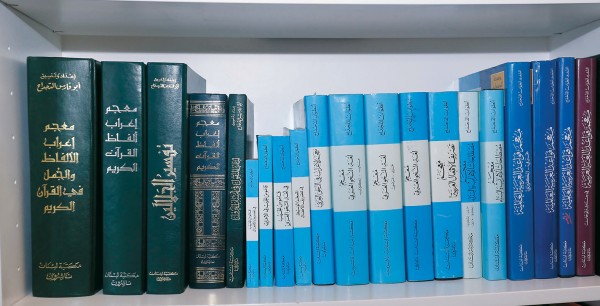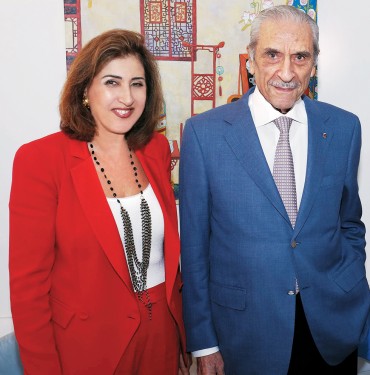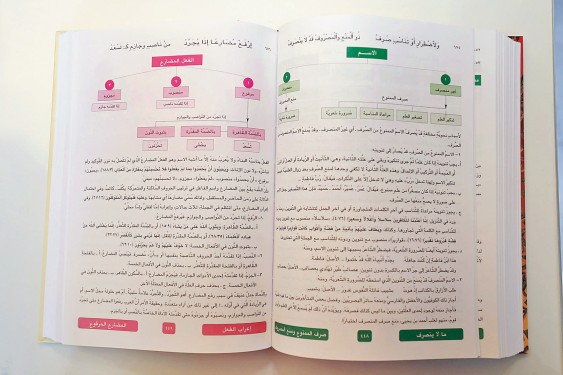Prestige issue 269-270, Dec.2015-Jan. 2016
Military discipline, diplomatic finesse and academic universality
If every person is entitled to a life, Antoine Robert El-Dahdah was entitled to three rich lives, full and intense, animated by the rigorous spirit of the military, bright and radiant soul of the diplomat and the vast culture of a Dahdah … At 85, armed with dynamism and an exceptional alertness, General Antoine El-Dahdah is a man of action. Precursor, an innovator and simplifying Arabic grammar, long considered dry and complicated, today, he can be proud having to his credit more than forty books on the subject, encyclopedias, mastering the online book. ..and a dozen of Lebanese and international decorations. Advocating the creation of an Arab Academy, like the French Academy, it is not surprising to see him one day in the forefront of Immortals. During our meeting with the General and Ambassador Antoine El-Dahdah, in the presence of his lovely wife Lisette, Prestige listened to a Lebanese who will leave his mark on the history of development of the Arabic language.
General Antoine El-Dahdah was awarded several decorations, but the dearest to his heart is the Order of the Cedar, the highest national distinction he proudly displays at his buttonhole. © Prestige
Who is El-Dahdah family? Dahdah is an old Maronite Lebanese family that was ennobled by Emir Bashir for services rendered by its members who worked for him. He gave them the Aramoun-Kesrouan region to exercise their authority. The Dahdah family was very popular and they were known to give their harvest to the peasants.
Three rich stages punctuate your life. Can you tell us first about your military background? I was 18 when I embraced, by vocation, a military career that is very special, because we know where one starts and it is unclear where one ends. The Lebanese Army took tremendous care of the education of officers, and I got the chance to take courses in major military schools. First in England at the Royal School of Artillery dating back to the XVIth century and whose traditions have remained very strict, where I learned that rapid response is vital in this field, followed by a course at the Naval School of Brest in France, to be a naval officer and order the national navy as a captain, where I learned the meaning of the maxim «A healthy mind in a healthy body». During sea crossings, to balance the sextant, one must have solid legs. Then the United States at the General Staff School, which trains future generals of the US Army, where I learned the importance of prediction in the process of military decision and management as a success factor. In 1971, President Sleiman Franjieh appointed me director of the General Security. From my military career, I especially acquired the sense of discipline in work and the method. In terms of administrative experience in Lebanon, I would say that when one is responsible, no exceptions must be admitted, not even one, who breaks the rule. I repeat, not a single exception, not even that which reports of a private nature and respect the personal sense of responsibility. I had the opportunity to attend great schools, so I was with a methodical cultivation capable of facilitating the solution of problems. Furthermore, I believe that an officer is worthy to be received in all circles. At 22, early in my career as a lieutenant, I was appointed aide of President Camille Chamoun. I had the chance with my work to be with him every day and even share their family lunches. This got me thinking and I asked myself one day when we were both sitting in the presidential car: what was more important, to be president at 52 years or his aide at 22 years.
After your appointment as Director of the General Security you are appointed Ambassador. Early in his term President Elias Sarkis had informed me that I will be appointed ambassador to Brazil, but I should wait for the formation of the government which will take between six and twelve months. During this period, I took the opportunity to improve my education in Arabic, in order to make my official speech to the large Lebanese community in Brazil in Arabic. So I began serious study with a teacher of Arabic language at a tight pace. It was at this time that I fell in love with this beautiful language, realizing how scientific it was, but how it was so rudely brought to the people. So I resolved to take the challenge to make a schematic Arabic grammar, easy to read and understand. The publication of my first book, the «Dictionary of Arabic grammar by charters and tables» was in 1979, before my trip to Brazil. This was the starting point for an intense academic life.
The Collection of books on Arabic grammar and conjugation. © Prestige
The alchemy of military discipline and humanism of a Dahdah generated works that will mark the grammar of the Arabic language.
Tell us about your diplomatic career … In Brazil, I discovered another Lebanon formed of a laborious and proud population, that has managed to firmly establish itself in a new world refractory to many other communities. I evaluated to 10% the population of Lebanese origin. On the occasion of the Lebanese Independence Day around November 22, all Lebanese clubs of major Brazilian cities invited me to attend their evening. To please them and celebrate with everyone, I decided to visit both the four major cities, namely Sao Paulo, Rio de Janeiro, Belo Horizonte and Brasilia, 1000km distant from each other. To celebrate the Lebanese National Day with the whole community I end on November 21st, 1980, in black tie at Brasilia airport to make an incredible tour: arrived in Sao Paulo at 21 hours and then at Rio Janeiro, Belo Horizonte monitoring, to return early in the morning of November 22nd in Brasilia. The Lebanese community in Brazil is very proud of its Brazilian nationality. The Lebanese are honorably settled and absorbed by the Brazilian environment, but they keep the feeling of belonging to a nation that is the envy of their peers. Although being accustomed to official ceremonies, I have never known a more comforting feeling than the one I had with the various Brazilian communities. In all my travels, I walked with the assurance of a man who carries on his shoulders a symbol of admiration among these populations.
Your academic career is rich and fertile … Two years after the publication of my first Arabic grammar book in Lebanon, when I considered the experience as a short term fancy, my publisher Khalil Sayegh, a great man, sent me a telex to Brazil, informing me that the first edition of the book has been completely sold out. He said: «You have the gift of convincing people. I advise you to continue on this path». It was a great motivation to know that the public was interested in me! In Brazil, I wanted to transfer this experience in English and French, but I noticed that translations of Arabic grammar made by my predecessors, which were necessarily erudite people, were a translation from Arabic, thought in French and English. This is a big mistake because, for example, when Arabs speak «Moubtada» it is a great prelate who is entitled to priority and can not be translated into words as an attribute or substitute or other … So I was the first in 1980, to translate Arabic grammar following the concept and Arabic expression. While the great German Orientalists, English and French are thinking in their respective languages when translating from Arabic and therefore can not reproduce the characteristic nuances of the language.
What did you do when you returned to Lebanon? Back in Lebanon, my editor asked if I’m ready to make a book of Arabic verbs like the French Bescherelle. According to him, many Arabic teachers want to compose books of conjugation, but their work is devoid of method and therefore is not worthy of being published by the Library of Lebanon. He said that the problem of conjugation has not been resolved and that I was, in his opinion, the only one to find a solution to the problem. So I spent three months reading about the Arabic verb, on its formation, its organization, its branches … and I eventually discovered, a first in the Arab world, that the verb has a great organization, very simple and scientific, qualities that exist in no other language. So I started to run, it can be said as forced labor for life, to compose two books on Arabic verb conjugation, where I developed a numerical nomenclature to define each of the 22 852 verbs that are Arabic grammatical heritage. In other words, I have laid the foundations for Arabic able to enter the computer through the front door.
Marcelle Nadim and General Antoine El-Dahdah. © Prestige
«It was love at first sight for this wonderful Arabic language realizing how scientific it was and could be simplified.»
How did you acquire the experience of the book «on line»? It is my son Fares, PhD from Harvard, Professor at Rice Houston, who informed me of the existence of a publishing house «online», in all languages, of the scale of Yahoo and Amazon. The author of a book can email his printed manuscript numbered. If the work is considered serious, it is accepted and displayed as «icon» on the screen and on sale in the catalog of “Lulu.com» Publisher. I tried to send an Al Azhar authorized Qur’an, with information on the syntax, they immediately adopted it. I currently have six Qur’ans with syntax in the Lulu catalog, they are especially sold in the United States, Canada, Pakistan and Indonesia.
You published the Grammatical analysis of the Qur’an … Having written fifteen books on Arabic grammar, I realized that I was missing the work since no problem concerned the Qur’an, which is the ultimate reference of any Arabic grammar book. During my stay in Abu Dhabi, I found that the analysis of the Qur’an made by the great Arab grammarians had at least fifteen volumes each, and had to have a whole library to consult with precision. It was therefore important to do a work on its syntax. I then launched the following challenge: to qualify for a place in the bookshelves, I should succeed in making the analysis of the Qur’an in one volume. After six months of research, I discovered the method and achieved the work.
A First dictionary of Arabic grammar with charters and tables and 40 books and online books … thirty years of titanic work by General Antoine El-Dahdah. © Prestige
You advocate the creation of an Arab Academy, like the French Academy … The Arab Academy is a necessity. In Abu Dhabi, I thought, at the sight of prestigious and financial means at their disposal, it was the right time to create an organization capable of saving Arabic grammar, while national academies were created for this purpose in Cairo, Baghdad and Damascus, with no result. These institutions consist of officials who do not have a margin of freedom, since they have to carry out what is required of them. With all the resources available to the Arab nation, one wonders what prevents to create this kind of institution.
What do you suggest? The Academy to be based in Beirut, including two members from Arab countries, designated the 1st time by the countries concerned and elected by their peers. Thus we can gather free cultural personalities with wide powers, in premises worthy of a modern administration.
What would be its mission? Save the Arabic language, encourage cultural production, put the modern electronic means at the service of language, unifying rules and procedures specifically to prevent the dismantling of the Arabic language, in correlation with the spread of geographic areas …
What prevented the evolution of the Arabic language? Arabic escaped its development during the industrial revolution in the XVIth and XVIIth centuries. At that time, Latin, which was the official language of Europe, broke out in five or six languages. Romanian can not understand today what the Portuguese writes. I fear that at the dawn of electronic revolution, the Arabic language will break out in at least four different systems in which the Moroccan will not understand his Iraqi friend anymore. This problem can not be solved by one person but by a pan-Arab Academy. We need an international institution composed of respectable personalities and free of their thoughts, to successfully produce solutions for the Arabic language. In the XVIIth and XVIIIth centuries, the Lebanese mountains kept speaking Arabic and not Turkish, printing books in Arabic letters and they were the only population to do so. Interview by Mireille Bouabjian









